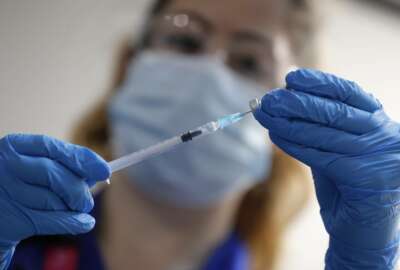Senators seek bigger role, more doses for VA in vaccine distribution efforts
The Veterans Health Administration also said it will not require the COVID-19 vaccine as a requirement of employment at the department. VHA has vaccinated 73% of...
The Department of Veterans Affairs won’t require the COVID-19 vaccine as a condition of employment, at least not yet.
Richard Stone, VA’s acting undersecretary for health, said he had the authority to mandate the vaccine for employees at the Veterans Health Administration.
“I have that authority, but I’m not going to use it,” he told the Senate Veterans Affairs Committee Wednesday afternoon. “I’m not going to use it under the [Food and Drug Administration’s] emergency-use authorization. When there’s full licensure of the vaccine we’ll revisit that decision.”
Stone didn’t have exact data on how many VHA employees had refused the vaccine. He said 73% of the VHA workforce had received the vaccine so far, including 90% of the department’s clinical personnel, though those numbers have likely changed in recent days.
“Our employees are dramatically taking the vaccine,” he said. “This is much different than the commercial marketplace.” About 5,000 more people are coming to work at VA health facilities today as they were before vaccinations, Stone reiterated. Fewer than 1,100 employees are absent from work due to quarantine or illness related to COVID-19, he said.
Those who have refused the vaccine were primarily non-licensed personnel at VA’s community living centers, Stone added.
Lawmakers in both the House and Senate have been relatively pleased with how VA has been distributing the COVID-19 vaccine to both employees and veterans, and in some cases, they’re pushing the Department of Health and Human Services to give VA more doses and a more prominent seat at the table in the federal government’s distribution efforts.
As of earlier this week, VA had received 2.3 million doses of COVID-19 vaccines from HHS and had distributed more than 2.1 million of them. That total includes 263,070 VA employees, more than 1.4 million veterans and 11,514 “federal partners” who have received at least one dose, according to the department’s public data source.
Sens. Jon Tester (D-Mont.) and Jerry Moran (R-Kan.), the chairman and ranking member of the Veterans Affairs Committee, met earlier this week with top leaders of the Biden administration’s COVID-19 response team.
The two senators have also asked the administration to add VA to the Defense Production Act Committee, which advises the president on how best to use the act during crises like the current pandemic.
“I can’t give you guys enough credit. Quite frankly, we just need to get more vaccines in your hands to get distributed,” Tester said. “We’re going to continue to push the administration in a bipartisan way to use all the authorities they have to get more doses allocated for the VA.”
The department has the capacity to distribute anywhere between 300,000-to-600,000 vaccines doses each week, Stone said.
So far, VA has been receiving roughly 125,000 doses each week from HHS.
That will change next week, Stone said, when VA is expected to receive close to 600,000 doses.
That will help the department make a dent in its goal of vaccinating the 6 million veterans who are active users of VA health care within a 120-day period, but it’s unclear whether it’ll continue to receive a sustained, weekly supply of 500,000-to-600,000 doses.
“We’d like every veteran in America to be vaccinated, but right now with the austere supply we have, we are targeting the 6 million active users of the system,” Stone said. “Those 6 million active users are those who have depended upon us. It’s absolute that we must take care of those 6 million first before we look at any expanded population.”
In a conversation with reporters earlier this week, VA Secretary Denis McDonough suggested the department could play a bigger role in vaccinating a broader population of veterans and others. VA is focused on showing it can quickly administer the doses that it’s been given to VA employees and priority veterans first, before considering other populations.
“As supply grows, we want to make sure we have vaccinators, so we want to make sure that we understand … what the team has to offer but then also looking around at other innovative and creative ways to think about that,” McDonough said. “There’s a lot of people who come to and through VHA… and U.S. military medical training. Are there ways for us to extend vaccinators using that? And we’ll work with the inter-agency on that.”
The department does have memorandums of understanding to vaccinate frontline personnel at both the Department of Homeland Security and the U.S. Capitol Police, McDonough said. And Moran, the Senate committee’s ranking member, suggested more agencies were seeking VA’s services to reach their own employees.
Meanwhile, Stone said VA was discussing how the department could initiate “fourth missions” with FEMA to vaccinate others, including the caregivers and spouses of veterans who have already been inoculated or are waiting for a dose.
“We’re talking to a number of states about exactly that and are working with a number of states to try and get it in that manner and thus unload the rest of the state from the vaccine … and protect veterans at the same,” Stone said.
Copyright © 2025 Federal News Network. All rights reserved. This website is not intended for users located within the European Economic Area.
Nicole Ogrysko is a reporter for Federal News Network focusing on the federal workforce and federal pay and benefits.
Follow @nogryskoWFED
Related Stories

New VA secretary ‘digging in’ on agency’s collective bargaining challenges




